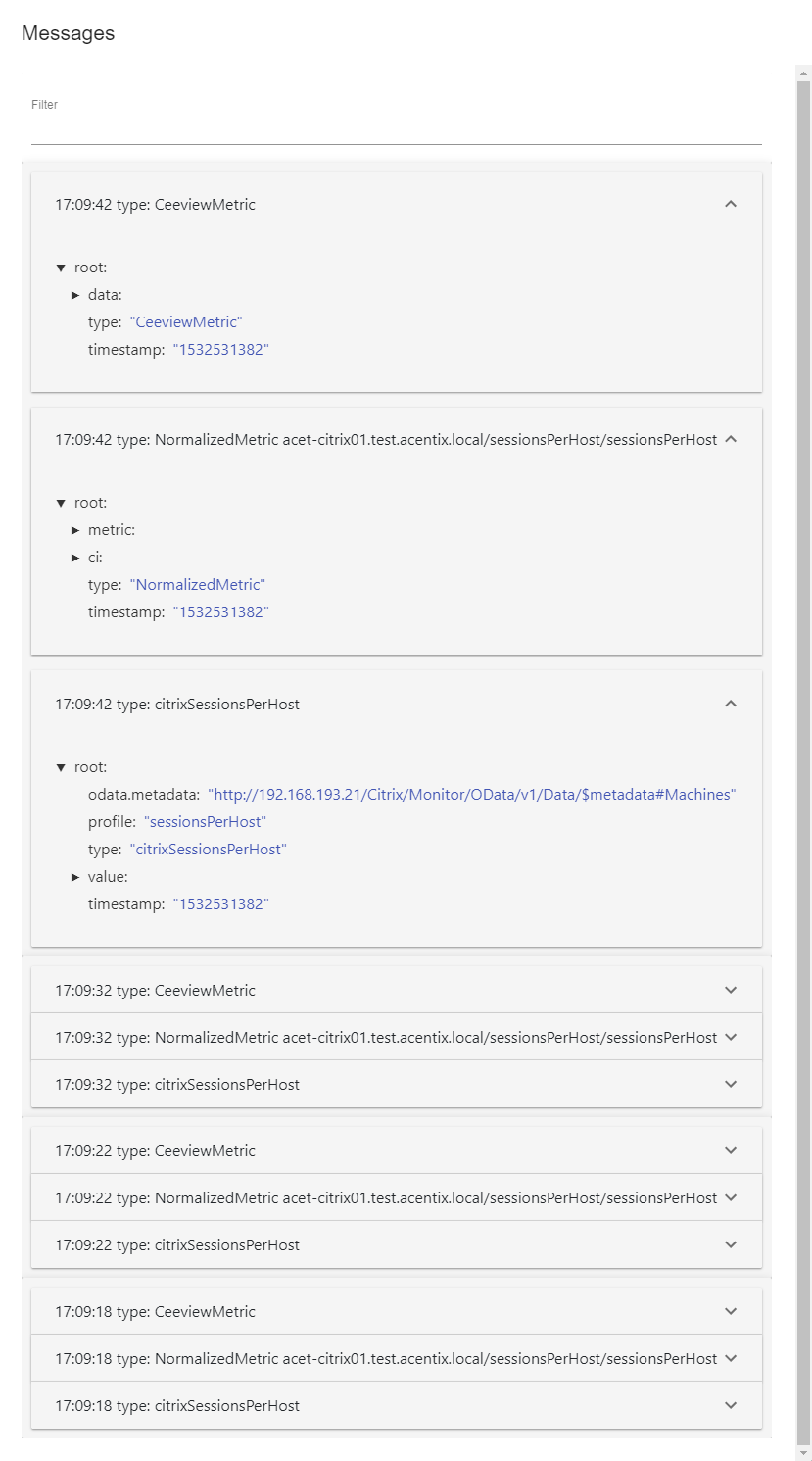Normalization
Normalization of messages
Messages consist of nested key-value pairs. The user interface can be used to follow the message flow through 1Gateway, visualizing the message content. The File Writer plugin can be used for debugging and viewing message content. An example of a message coming in from Citrix, converted into a NormalizedMetric and finally converted into a message that the CeeView plugin can process. The different stages of the message are stacked to prevent information loss. Whenever a message is modified (mapped), a new message is created and bundled together. This makes the mapping process lossless. There are three types of normalized messages: normalized alarms, normalized metrics and normalized incidents.
Normalized messages
Normalized messages are identified by their message type and have a predefined structure. They can be processed by any plugin with the help of a mapper. Mappers translate endpoint-specific messages into normalized messages and vice versa. Normalized alarms and metrics contain a ci/ branch in the message.
Normalized configuration items (CIs)
Element | Description |
|---|---|
ci/id | The identifier of the CI |
ci/name | The name of the CI (e.g. hostname) |
| ci/fqdn | Fully qualified domain name |
| ci/ip | IP address for this ci |
| ci/domain | Network domain |
ci/description | The description of the CI |
ci/element | The element of the CI (e.g. mount point) |
| ci/elementid | The id of the element |
| ci/elementtype | Type of element (e.g. disk) |
ci/type | The type of the CI (e.g. server) |
ci/parent | The id of the parent CI |
Normalized alarms
Normalized alarms or events.
Element | Description |
|---|---|
event/id | A unique identifier for the event |
event/text | The message text |
event/description | The description of this type of event |
event/severity | The event severity, 0 (clear) to 5 (fatal) |
event/type | The type of event (free form) |
event/metricid | If this event was caused by a metric, the id of that metric |
event/code | A code for the type of event that can be linked to a runbook or KB |
event/impact | The impact |
event/correlationid | Format pluginaddress.id in case this event is synchronized with another system |
event/timestamp | Timestamp of the event (epoc in seconds) |
| event/suppressionkey | ID of the event used to suppress |
Normalized metrics
Element | Description |
|---|---|
metric/id | Unique id for this metric |
metric/value | Metric value |
metric/descritpion | The description of the metric type |
metric/unit | Metric unit (e.g. Gigabytes) |
| metric/shortunit | Abreviated metric unit (e.g. GB) |
metric/timestamp | Timestamp when the metric was generated in epoc seconds |
metric/type | Metric type (e.g. space) |
metic/subtype | Optional further classification of the metric type (e.g. free) |
metic/interval | Time between metric values in seconds |
| metric/changed | Indicates whether this incident was updated since the last time we saw it. True / false |
Normalized incidents
Element | Description |
|---|---|
incident/id | The incident id |
| incident/name | The name of the Incident (i.E. ServiceNow=number, PureService=id) |
| incident/type | Type of incident, one of incident, feature-request, service-request, change, problem, task |
| incident/category | Optional classification of the incident (i.E inquiry, database, hardware, network, software) |
| incident/subject | The incident subject |
| incident/description | The incident description |
| incident/status | The incident state, 1-9 |
| incident/impact | The effect an incident has on business, 1-5 |
| incident/urgency | The extent to which the incident's resolution can be delay, 0-5 |
| incident/priority | How quickly the service desk should address the incident, 0-5 |
| incident/assignedusername | The Incident assigned User |
| incident/assigneduserid | The Incident assigned User id |
| incident/assignedgroupname | The Incident assigned Group |
| incident/assignedgroupid | The Incident assigned Group id |
| incident/createdon | Timestamp when the incident was generated (epoc sec) |
| incident/updated | Indicates whether this incident was updated since the last time we saw it. True / false |
incident/correlationid | Identifier used to synchronize a ticket with other systems |
